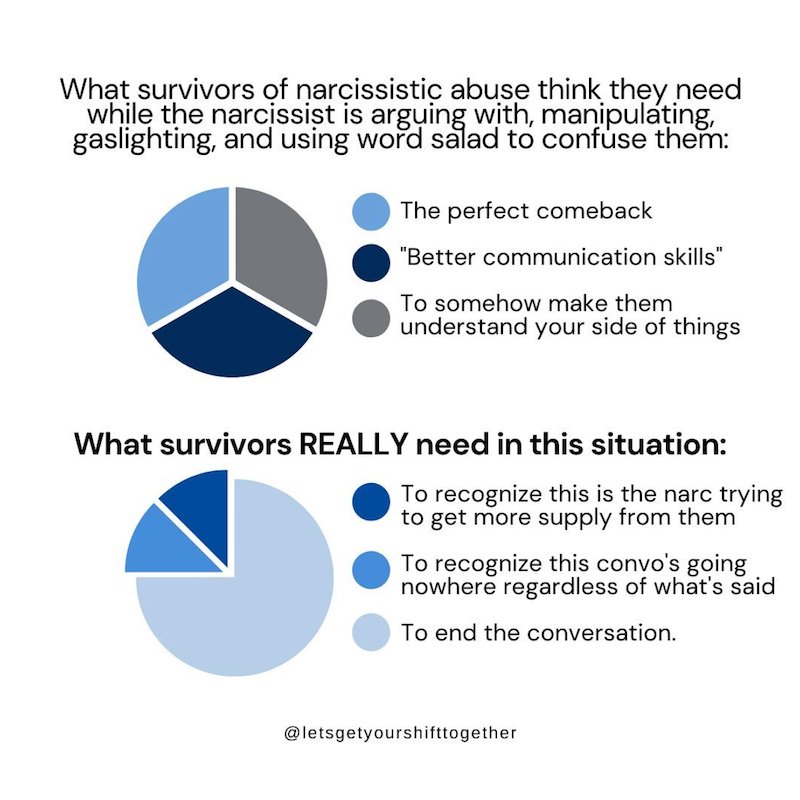How To Shut Down A Narcissist In An Argument

Imagine this: the air crackles with unspoken tension. You're caught in a familiar loop, a frustrating argument where logic seems to evaporate and your words twist into something unrecognizable. It's like trying to nail jelly to a wall, only the jelly is made of meticulously crafted justifications and skillfully deployed emotional barbs. The frustration mounts, and you just want to escape.
Navigating arguments with someone exhibiting narcissistic traits can feel like traversing a minefield. The key lies not in "winning" the argument (a near impossible feat), but in disarming the dynamic and protecting your own emotional well-being.
Understanding the Landscape
Before diving into strategies, understanding the underlying motivations is crucial. Narcissism, as outlined in the Diagnostic and Statistical Manual of Mental Disorders (DSM-5), involves a pervasive pattern of grandiosity, a need for admiration, and a lack of empathy.
However, it's important to remember that only a qualified professional can diagnose Narcissistic Personality Disorder (NPD). Many individuals may exhibit traits without meeting the full criteria.
Why Arguments Escalate
Arguments with individuals displaying narcissistic traits often escalate due to their inherent need to be right and in control. They may employ tactics like gaslighting, blame-shifting, and emotional manipulation to maintain their perceived superiority.
According to research from institutions like the Mayo Clinic, these behaviors stem from deep-seated insecurities and a fragile sense of self.
Strategies for Disengagement
The goal isn't to change the other person, but to change how you respond. Here are some effective strategies to shut down a narcissistic argument.
1. The Gray Rock Method
Become as interesting as a gray rock. This involves responding with minimal emotion and information, giving the other person nothing to feed off of.
Simple, unenthusiastic answers like "Okay," "Maybe," or "I see" can effectively deflate their attempts to provoke a reaction.
2. Set and Maintain Boundaries
Clearly define your boundaries and consistently enforce them. If they resort to insults or belittling remarks, calmly state that you will end the conversation if the behavior continues.
Follow through with your threat. This demonstrates that you value your own well-being and will not tolerate disrespect.
3. Focus on Facts, Not Feelings
When addressing an issue, stick to concrete facts and avoid getting drawn into emotional debates. Present your information clearly and concisely, without offering justification or apology.
For instance, instead of saying "I feel like you never listen to me," try "During our meeting on Tuesday, I noticed you were looking at your phone while I was speaking."
4. Validate (Selectively)
Offering limited validation can sometimes de-escalate a situation, but be cautious. Acknowledge their perspective without agreeing with their conclusions.
For example, "I understand you feel frustrated, but..." This acknowledges their emotion while still allowing you to present your point of view.
5. The Power of Silence
Sometimes, the most effective response is no response at all. Simply refusing to engage can deprive them of the attention they crave.
Walk away or simply cease responding to their baiting tactics.
6. Seek Support
Dealing with narcissistic behavior can be emotionally draining. Lean on friends, family, or a therapist for support and guidance.
Talking to someone objective can help you process your emotions and develop healthy coping mechanisms.
A Shift in Perspective
Ultimately, shutting down a narcissistic argument isn't about "winning." It's about protecting your mental and emotional health. It's recognizing that you cannot control another person's behavior, but you can control your reaction to it.
By implementing these strategies, you can navigate these challenging interactions with greater confidence and peace of mind.


















